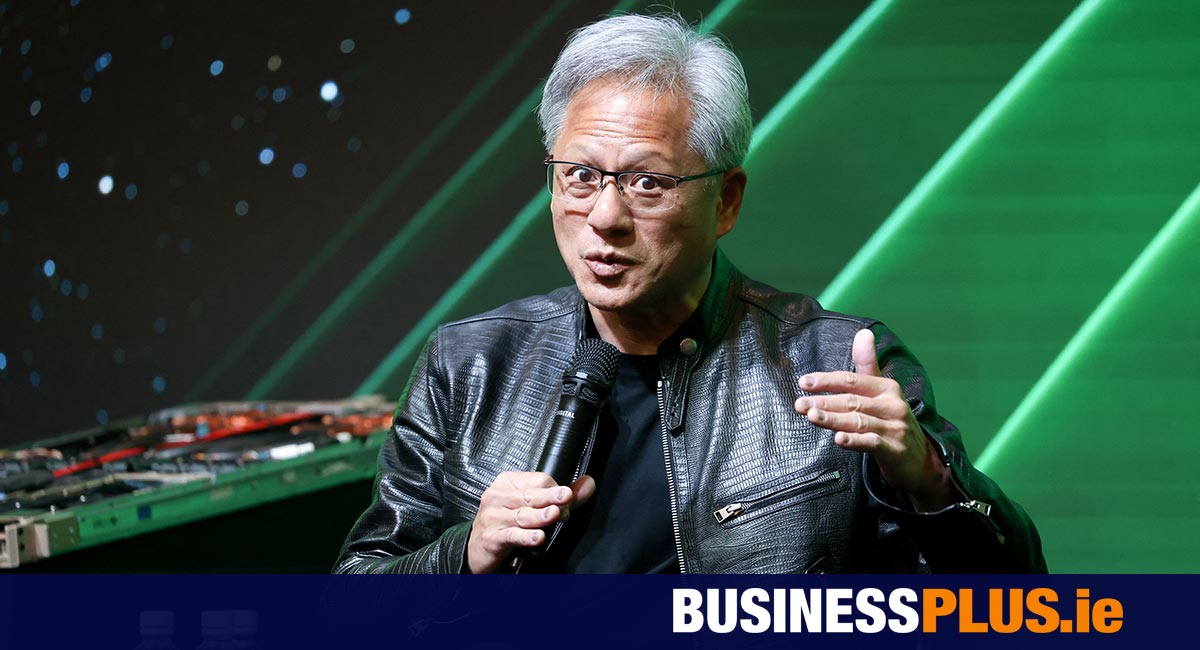It was the biggest single one-day sell-off in corporate history, so should you hold on to Nvidia stock or sell it on, writes Patrick Tooher.
Shares in microchip giant Nvidia - led by founder Jensen Huang - cratered on Monday, losing almost $650bn, after Chinese start-up DeepSeek developed a free-to-use artificial intelligence (AI) model that it claimed can compete with US rivals such as ChatGPT for a fraction of the cost.
Over the weekend, it became the most downloaded iPhone app in the US.
The news called into question the huge sums being spent on AI by American firms, along with their demand for, and reliance on, Nvidia's most expensive, state-of-the art chips.
Even 'America First' President Donald Trump hailed DeepSeek's breakthrough, saying it was "a good thing for us" if AI could be done "cheaper' to get 'the same result".
Nvidia is particularly exposed to DeepSeek's low-cost model because the US tech titan dominates the market for the most high-end and expensive chips used to power AI models.
The turmoil has left small investors in Ireland and the UK, many of whom own shares in Nvidia either directly or through their pensions or investment funds, with important questions that could seriously affect their wealth.
Having been de-throned as the world's biggest quoted company in Monday's rout, should they sell out of Nvidia? Or is it best to keep their nerve and wait for the shares to bounce back?
Experts counsel private shareholders not to panic.
Nvidia last year became the fastest company to go from $2 trillion to $3 trillion in market value. It continued its vertiginous ascent to peak at $3.7 trillion recently, so a "correction" at some stage was overdue.
Sceptics were quick to seize on its fall from grace as just a taster of the pain in store for those who have blindly bought its shares and those of other tech giants such as Microsoft and Facebook-owner Meta.
Along with Apple, Amazon, Google's owner Alphabet and Tesla, they are known as 'the Magnificent Seven' - or Mag 7.
"This is the beginning," Wall Street guru Nassim Nicholas Taleb told Bloomberg News.
"The beginning of an adjustment of people to reality. Because now they realise it's no longer flawless. You have a small little chip on the glass."
Taleb, 64, is best known for his best-selling book The Black Swan, which explores the extreme impacts of rare and unpredictable occurrences - such as DeepSeek's announcement that seemed to catch even the most seasoned investors on the hop.
Having nosedived 17pc in a day, Taleb thinks further Nvidia falls could be two or even three-times greater.
The good news for Nvidia fans is that Taleb, who is famous for his gloomy forecasts, is not always right.
He seemed to call the top of the tech-heavy US stock market a year ago - since then it has soared, mainly on the back of the AI frenzy.
Small shareholders seem keen to ignore his warning.
They have been big buyers of Nvidia over the past few years - and their loyalty shows no sign of abating despite the shock news from China.
Retail investors bought a record amount of Nvidia's shares on Monday - even as the price plummeted. The net purchase of $562m was the largest since records began in 2014, according to data firm Vanda Research.
This helped to stabilise Nvidia's share price, which rose almost 9pc yesterday.
Wall Street analysts were quick to take to the airwaves and proclaim that DeepSeek's advances were actually a good thing for the chip sector as a whole and therefore for Nvidia.
Stacy Rasgon of investment bank Bernstein told business news channel CNBC that reducing the cost of AI was "fantastic" for semiconductor demand and spending on chips of all shapes and sizes.
He cited the Jevons Paradox. This is a theory first floated by the economist William Jevons in 1865, who observed that the Watt steam engine made far more efficient use of coal than earlier designs.
Rather than reducing the amount of coal used, as one might expect, this led to an increase in coal consumption, because people deployed the fuel in a wider range of applications.
In the context of AI, this would mean a lower-cost model from DeepSeek would encourage more widespread use and therefore be beneficial for Nvidia and its peers.
Microsoft boss Satya Nadella also hailed DeepSeek's announcement.
"As AI gets more efficient and accessible, we will see its use sky-rocket, turning it into a commodity we just can't get enough of," he said.
So should you sell, or hold on? Ultimately, that investment decision boils down to the price of Nvidia shares - and your attitude to risk.
The stock market sell-off means the ratio of its share price to its earnings has fallen to just over 30 times.
A high price-to-earnings ratio can indicate that a share is overvalued. Nvidia's ratio is not high by historic standards.
What's more, even after the dramatic sell-off, the share price is still almost double where it was a year ago.
One thing investors should not do is panic, says Susannah Streeter, head of money and markets at investment platform Hargreaves Lansdown.
But they also should avoid putting "all their eggs in one basket".
If investors are concerned about continued uncertainty ahead, "they could look to spread their risk into funds which offer global diversification".

In practice, anyone who holds low-cost tracker funds has already invested in Nvidia and the other tech giants because they are such big components of major stock market indices.
If you believe Nvidia and other Mag 7 stocks are good long-term bets, you could look at technology funds.
Nvidia is the largest holding at 10.5pc in Polar Capital Technology Trust's portfolio, closely followed by Microsoft and Meta.
And it is the fifth largest holding in the widely-held Scottish Mortgage Investment Trust - with Amazon second and Meta fourth.
Wall Street analysts seem to be standing by Nvidia for now. Of the 62 analysts that cover it, 56 rate the stock a "buy" with 21 of them describing it as a "strong buy".
The remaining six say "hold" the shares if you already own them. None, as yet, recommend to sell.
Marc Halperin, co-head of European equities at Edmond de Rothschild in Paris, said it could take a few days to determine whether this week's tech rout was "just a blip or a major change in market sentiment and positioning".











